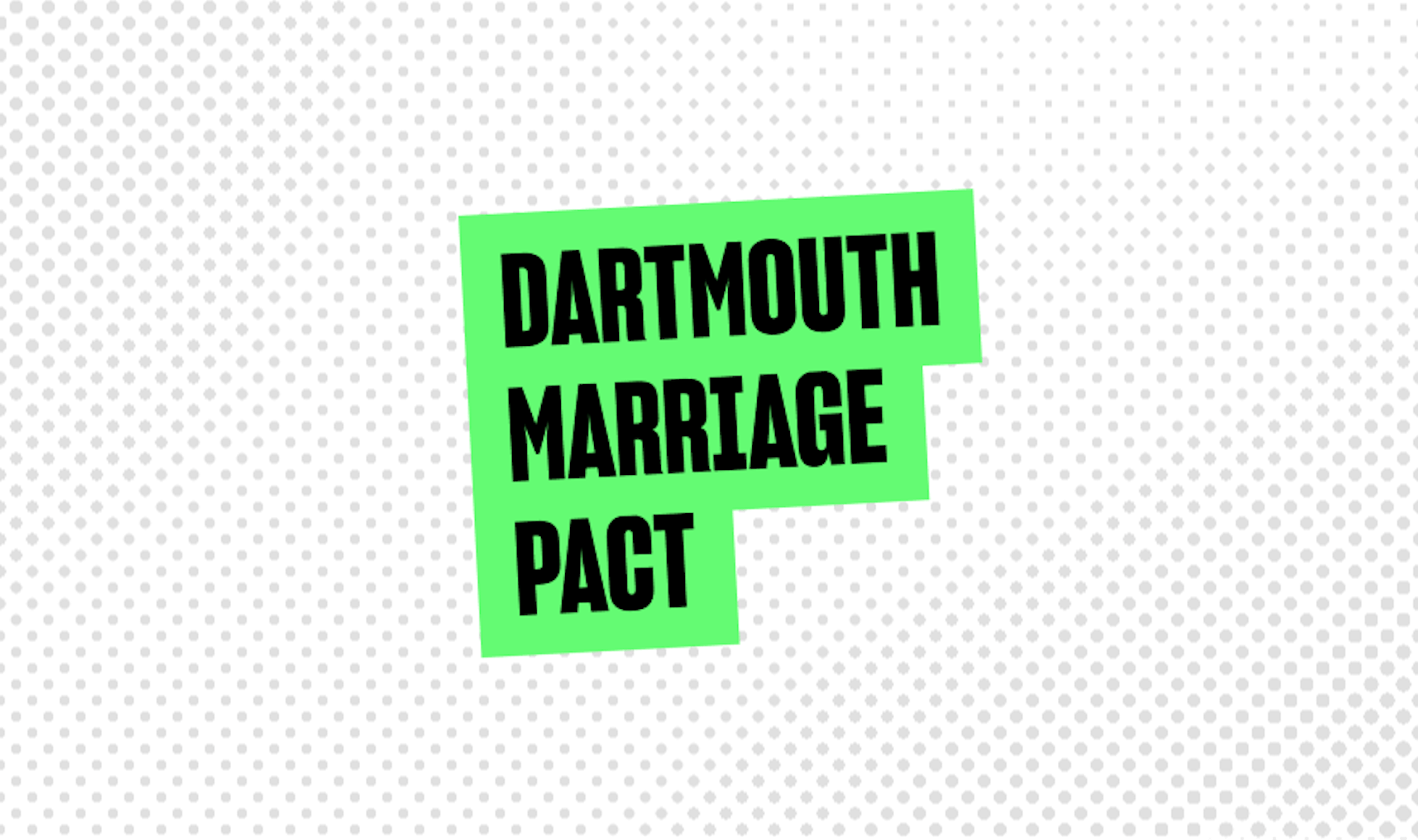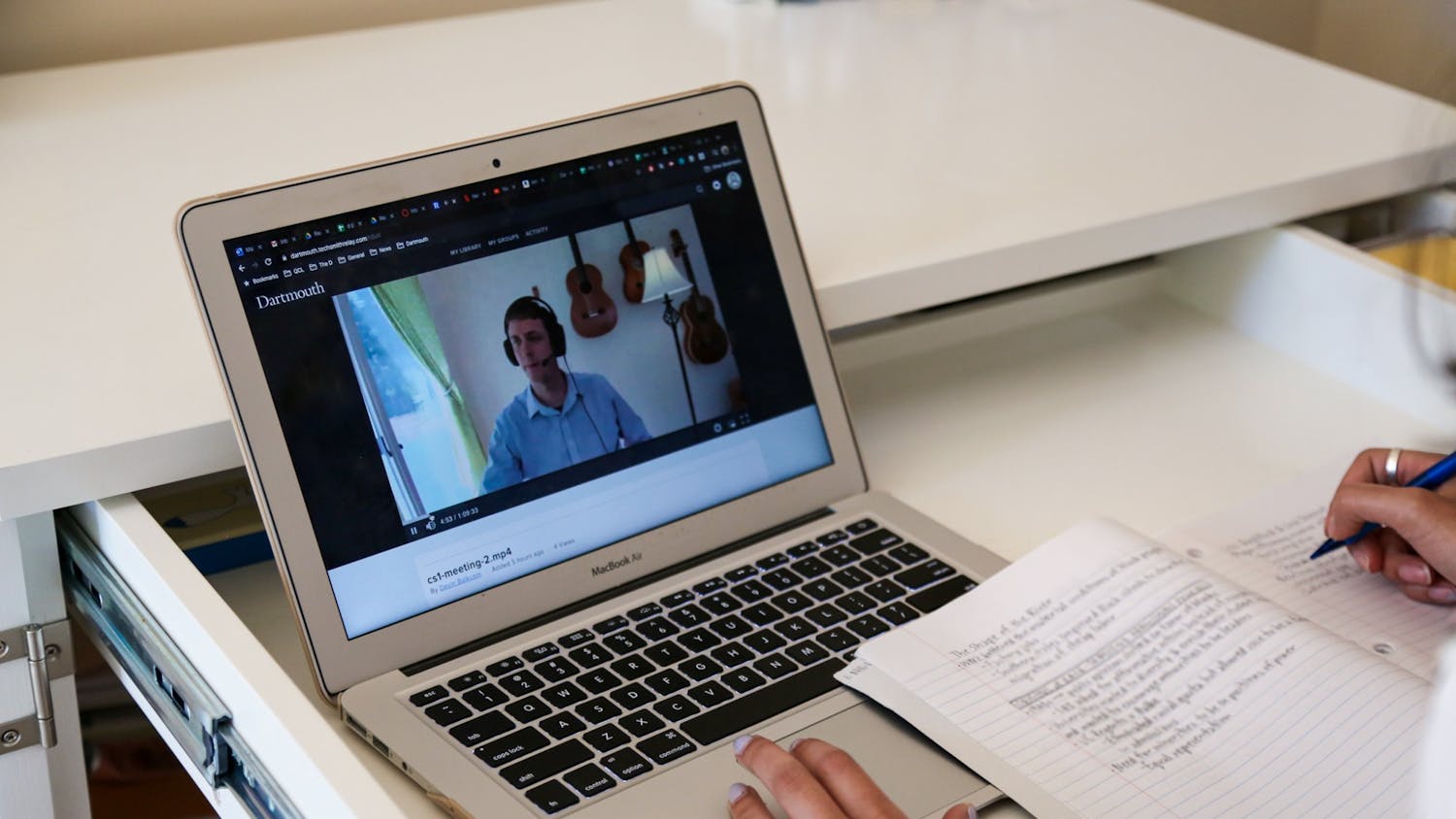On Monday, over 1,500 Dartmouth students received emails revealing their supposedly perfect partners.
Making its Dartmouth debut this year, Marriage Pact — a program devised by Stanford University students in 2017 — sets out to provide each participant a romantic or friendship match based on answers to a 50-question survey on values, perspectives and life outlook.
On Monday night, most participants received an email revealing the name of their optimal match, compatibility percentile with respect to the school-wide community and shared values. 157 students did not receive a match, in part due to a deficit of heterosexual and bisexual men compared to heterosexual and bisexual women.
The program received over 1,000 sign-ups the first day, and a total of 1,749 students — or 42% of the total undergraduate student body — participated by the time the form closed on Monday.
Marriage Pact school partners Tippa Chan ’23 and Sara Cavrel ’23 played the self-described role of the “messengers,” managing the Dartmouth Marriage Pact Instagram account and communicating with the creators of the pact at Stanford. They also helped to customize the last 10 questions of the questionnaire to best fit the Dartmouth community.
Chan said she and Cavrel brought Marriage Pact to Dartmouth in order to “connect the community with each other.”
“Especially in this time of COVID, particularly ’24s do not have many avenues to connect with people and to branch out,” Chan explained. “We really just wanted to establish a really neat way for Dartmouth students to meet other Dartmouth students, just to get out of their rooms and find new social circles because it’s pretty hard to penetrate those small social circles that you’re trapped in.”
Chan and Cavrel relied on Librex as their main channel for promoting the program, which they said allowed them to effectively advertise their platform and garner student support. However, Chan described the social media app as “toxic” and said dealing with comments on the platform was a challenge unique to the Dartmouth branch. She maintained that the use of Librex to promote Marriage Pact was a “win-lose situation.”
Cavrel added that she anticipated making friends would be even more difficult this winter, given the fact that the pandemic’s restrictions make it difficult to meet new people.
While Cavrel noted that much of the negative feedback to the program has come from students in relationships who felt they could not participate, she stressed that the survey provided a way to indicate relationship status — a question that asked “how single are you?” — so that those not interested in romantic relationships could use the program to find a friend rather than a romantic partner.
“The name of the whole algorithm I guess is misleading, but you can also use it to make friends,” Cavrel said.
Adriana Chavira ’24 said she decided to take the Marriage Pact survey because she was hoping to find a new friend with a similar personality to herself.
“I wasn’t looking for a romantic date,” Chavira said. “It was kind of an experiment. I haven’t met my match yet, so I’m not sure if they did a good job matching me. I’m going to go get lunch with him on Friday.”
Elizabeth Ding ’24 took the survey without any serious intentions of finding her ideal match.
“Almost all of my friends, including those in serious relationships, took the Marriage Pact simply out of curiosity,” Ding said.
However, Ding said she felt that the questions were geared toward finding someone with shared values rather than finding a surface-level connection.
While she did not know her match before the Marriage Pact, Ding said they “might become friends” in the future if they have shared classes.
Ding noted the organizers did an “efficient job” of publicizing the Marriage Pact and spreading the word about the survey in the weeks leading up to the match reveal.
Chan noted that one unexpected challenge of Marriage Pact was communicating release times. Originally set to arrive anywhere from 6 p.m. to 8 p.m., the match reveal email came out at approximately 10:15 p.m. due to the algorithm taking longer than expected, Chan said.
“Even though the anticipation was fun, maybe for next year it would be better if the organizers could tell us a set time our matches are going to come out,” Ding added.
Not everyone agreed with Ding’s positive outlook towards the program, however.
“I feel like the sentiment across campus is that it was a bust,” Max Montrose ’23 said. “In theory, it sounded like it was going to work out pretty well … but I think what ended up happening was that a lot of people’s matches went nowhere.”
Roughly 1% of students who filled out the form did not receive a match. In the hours leading up to the match announcement, emails to student participants attempted to remedy the deficit of straight and bisexual men by specifically soliciting their engagement, warning that “190 straight women are matchless.”
“You still have time to text a straight or bi male friend to save yourself (or a friend) from the waitlist,” one email read. “Be a hero, close that gap.”
Some students also took issue with the questions on the form. Isabel Adler ’21, for example, said that the survey should have asked what genders people wanted to be matched with instead of assuming what genders correspond to specific sexualities.
“It upset me that I put in my sexuality and it assumed the gender identity of people I wanted to be matched with,” Adler said.
Chan noted that she is unsure if she was able to represent Dartmouth as much as she could have in her choice of the final 10 questions, which asked people to rank their agreement with statements like, “It is more important to protect someone's feelings than to tell them the truth” and “I am always seeking adventure,” as well as questions like “Would you rather work a high-paying job that you hate or a low-paying job that you love?” However, she hopes that their efforts have managed to create community and allow people to meet one another.
Next year, Chan hopes to run Marriage Pact again, but with an expanded team to make it “more manageable.”
“[Cavrel] and I were quite stressed managing all the questions because we are not that representative of Dartmouth,” Chan said. “We are two international girls who are ’23s, so we [had] really only had two-and-a-half terms on Dartmouth’s campus.”
Cavrel is a member of The Dartmouth staff. Adler is a former member of The Dartmouth staff.





